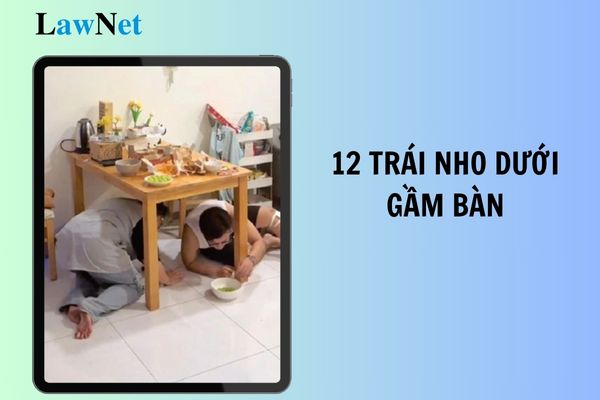What is the information on the 12 grapes under the table? Is propagating harmful cultural practices allowed within educational institutions in Vietnam?
What is the information on the 12 grapes under the table?
Origin of the 12 grapes under the table
The tradition of 12 grapes under the table, or eating 12 grapes under the table during New Year's Eve, originated in Spain in the late 19th century and quickly spread to many Latin American countries.
People believe that eating 12 grapes, which symbolize the 12 months of the year, will bring good luck, health, and prosperity. Specifically, each grape eaten is a wish for a month full of joy and success.
However, in some places, this custom is varied by placing 12 grapes under the table at the stroke of New Year's Eve. This is believed to help attract more luck in love, money, and happiness.
Significance of the 12 grapes under the table
- 12 Grapes: Symbolize the 12 months of the year.
- Under the Table: Represents humility, a desire to attract good things without ostentation.
- New Year's Eve: A sacred transitional moment, making wishes more likely to come true.
Note: The information is for reference only!

What is the information on the 12 grapes under the table? Is propagating harmful cultural practices allowed within educational institutions in Vietnam? (Image from the Internet)
Is propagating harmful cultural practices allowed within educational institutions in Vietnam?
Article 21 of the Education Law 2019 provides as follows:
Prohibition of abuse of educational activities
1. It is prohibited to abuse educational activities to distort State guidelines, policies, legislation; to oppose the Socialist Republic of Vietnam, to separate the block of great national solidarity, to incite violence, to propagate war of aggression, to erode the good traditions and harmful cultural practices, to publicize superstitious beliefs and bad harmful cultural practices, or to attract learners into social evils.
2. It is prohibited to make corrupt use of educational activities for self-interest purposes.
In addition, Article 22 of the Education Law 2019 regulates prohibited activities in educational institutions as follows:
Prohibited activities in educational institutions
1. Disrespect of dignity and honor, committing physical assault towards teachers, staff, labour workers of educational institutions and towards learners.
2. Distortion of educational contents.
3. Cheating in learning, testing, examination, admission.
4. Smoking; alcohol consumption; security and order disruption.
5. Forcing students to take extra classes for money.
6. Forcing contributions in cash or in kind in the name of educational sponsorship or support.
Thus, the current law strictly prohibits propagating a war of aggression, eroding good traditions and harmful cultural practices, publicizing superstitious beliefs and bad harmful cultural practices, or attracting learners into social evils.
Therefore, propagating harmful cultural practices within educational institutions in Vietnam is a prohibited activity.
What are the regulations on educational levels and entry ages in general education in Vietnam?
According to Article 28 of the Education Law 2019, the educational levels and entry ages in general education in Vietnam are as follows:
- Educational levels and age groups of general education are regulated as follows:
+ Primary education lasts for 05 school years, from the first to the fifth grade. The entry age for the first grade is 06;
+ Lower secondary education lasts for 04 school years, from the sixth to the ninth grade. Students must complete the primary educational programme before entering the sixth grade. The entry age for the sixth grade is 11;
+ Upper secondary education lasts for 03 school years, from the tenth to the twelfth grade. Students must complete the lower secondary educational programme before entering the tenth grade. The entry age for the tenth grade is 15;
- Cases where schooling could be commenced at younger ages or at higher ages prescribed in clause 1 of this Article are as follows:
+ Commencing schooling at younger ages for students with early intellectual development;
+ Commencing schooling at older ages for students repeating classes, students living in areas with exceptional socio-economic difficulties, students belonging to ethnic minorities, disabled and handicapped students, students with physical or intellectual disadvantages, orphan students, students of poor households, students returning from overseas and other cases as prescribed by law.
- General education shall be divided into 2 phases: basic education and career-orientated education. Basic education includes primary education and lower secondary education; career-oriented education is upper secondary education. Students of institutions of vocational education shall learn the upper secondary education knowledge.
- The Minister of Education and Training shall stipulate the teaching and learning of the Vietnamese language to children of ethnic minorities prior to the commencement of the first grade; the teaching of the upper secondary education knowledge in institutions of vocational education; and the cases as prescribed in clause 2 of this Article.

